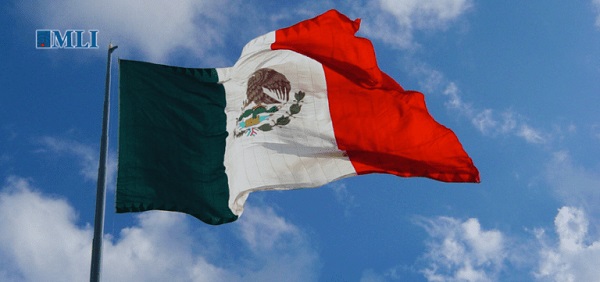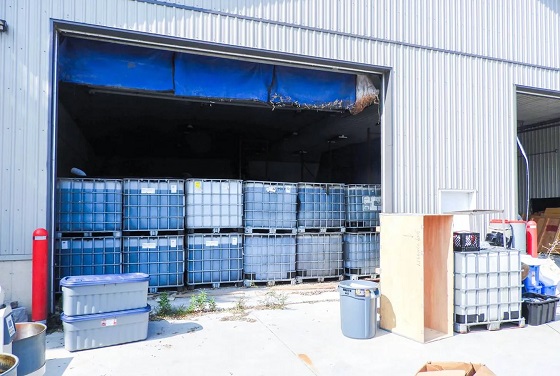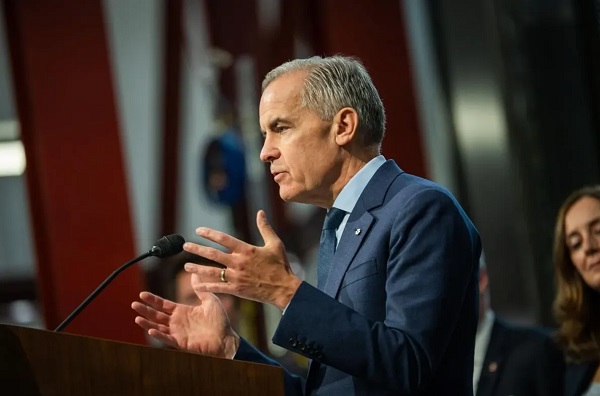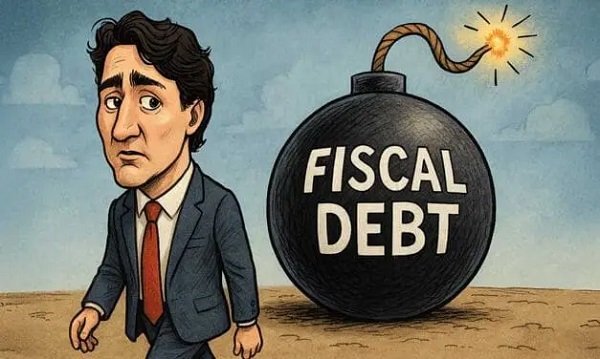Crime
Mexican cartels are a direct threat to Canada’s public safety, and the future of North American trade

From the Macdonald Laurier Institute
By Gary J. Hale for Inside Policy
RCMP raided a fentanyl ‘superlab’ in Falkland, BC, with ties to a transnational criminal network that spans from Mexico to China.
On October 31, residents of Falkland, BC, were readying their children for a night of Halloween fun. Little did they know that their “quaint, quiet, and low-key little village” was about to make national headlines for all the wrong reasons.
On that day, RCMP announced that it had raided a fentanyl “superlab” of scary proportions near Falkland – one that police called the “largest and most sophisticated” drug operation in Canada. Officers seized nearly half-a-billion-dollars’ worth of illicit materials, including 54 kilograms of finished fentanyl, 390 kilograms of methamphetamine, 35 kilograms of cocaine, 15 kilograms of MDMA, and six kilograms of cannabis” as well as AR-15-style guns, silencers, small explosive devices, body armour, and vast amounts of ammunition.
They also found massive quantities of “precursor chemicals” used to make the drugs. This strongly suggests that the superlab was tied into a transnational criminal network that spans from Mexico to China – one that uses North America’s transportation supply chains to spread its poisonous cargo across Canada and the United States.
The Canada-US-Mexico relationship is comprised of many interests, but the economic benefits of trade between the nations is one of the driving forces that keep these neighbours profitably engaged. The CUSMA trade agreement is the successor to NAFTA and is the strongest example globally of a successful economic co-operation treaty. It benefits all three signatories. This level of interdependence under CUSMA requires all parties to recognize their respective vulnerabilities and attempt to mitigate any threats, risks, or dangers to trade and to the overall relationship. What happens to one affects all the others.
The supply chain, and the transport infrastructure that supports it, affects the balance books of all three. While the supply chain is robust and currently experiences only occasional delays, the different types of transport that make up the supply chain – such as trucks, trains, and sea-going vessels – are extremely vulnerable to disruption or stoppages because of the unchecked violence and crime attributed to the activities of Mexican Transnational Criminal Organizations (TCOs). These cartels operate throughout Mexico, from the Pacific ports to the northern plains at the US-Mexico border.
The sophistication of the Falkland superlab strongly suggests connectivity to multi-national production, transportation, and distribution networks that likely include China (supply of raw products) and Mexico (clandestine laboratory expertise).
For most Canadians, Mexican cartels call to mind the stereotypical villains of TV and movie police dramas. But their power and influence is very real – as is the threat they pose to all three CUSMA nations.
Mexico’s cartels: a deadly and growing threat
Mexican cartels started as drug trafficking organizations (DTOs) in the 1960s. By the late 1990s they had evolved to become transnational enterprises as they expanded their business beyond locally produced drugs (originally marijuana and heroin) to include primarily Colombian cocaine that they transported through Mexico en route to the US and Canada.
Marijuana and the opium poppy are cultivated in Mexico and, in the case of weed, taken to market in raw form. While the cartels required some chemicals sourced from outside Mexico to extract opium from the poppy and convert it into heroin, the large-scale, multi-ton production of synthetic drugs like Methamphetamine and today Fentanyl expanded the demand for sources of precursor chemicals (where the chemical is slightly altered at the molecular level to become the drug) and essential chemicals (chemicals used to extract, process, or clean the drugs.)
The need to acquire cocaine and chemicals internationalized the cartels. Mexican TCO’s now operate on every continent. That presence involves all the critical stages of the criminal business cycle: production, transportation, distribution, and re-capitalization. Some of the money from drug proceeds flow south from Canada and the US back to Mexico to be retained as profits, while other funds are used to keep the enterprise well-funded and operational.
In Mexico, the scope of their activities is economy-wide; they now operate many lines of criminal business. Some directly affect Mexico’s economic security, such as petroleum theft, intellectual property theft (mainly pirated DVDs and CDs), adulterating drinking alcohol, and exploiting public utilities. Others are in “traditional” criminal markets, such as prostitution, extortion, kidnapping, weapons smuggling, migrant smuggling and human trafficking. Organized auto theft has also become another revenue stream.
Criminal Actors
The Cartel de Sinaloa (CDS or Sinaloa Cartel) and the Cartel Jalisco Nueva Generacion (CJNG) are the two principal TCO’s vying for territorial control of Mexico’s air, land, and maritime ports, as well as illegal crossing points. These points on the cartel map are known as “plazas,” and are often between formal ports of entry into the US. By controlling territories crucial for the inbound and outbound movement of drugs, precursors, people, and illegal proceeds, the cartels secretly transport illicit goods and people through commercial supply chains, thus subjecting the transportation segment of legitimate North American trade to the most risk.
That is giving the cartels the power to impair – and even control – the movement of Mexico’s legitimate trade. While largely kept out of the public domain, incidents of forced payment of criminal taxation fees, called “cuotas,” and other similar threats to international business operations are already occurring. For instance, cuotas are being imposed on the transnational business of exporting used cars from the US to Mexico. They’re also being forced on Mexican avocado and lime exporters before the cartels will allow their products to cross the border to the US and international markets. This has crippled that particular trade. Unfortunately, the Mexican government has been slow to react, and the extortion persists throughout Mexico. It is worth repeating – these entirely legitimate goods reach the market only after cartel conditions are met and bribes paid.
The free trade and soft border policies of the US of recent years have allowed cartel operatives to enter that country and work the drug trade with limited consequence. In May, the U.S. Drug Enforcement Administration (DEA) published the National Drug Threat Assessment 2024, where it reported that the Jalisco and Sinaloa cartels operate in all 50 US states and are engaged in armed violence in American cities as they fight for market shares of the sales of Methamphetamine, Fentanyl, and other drugs sourced from Mexico.
The DEA’s findings should sound alarms in Canada. Canada and the US have similar trade and immigration policies, which allow the Mexican cartels to easily enter and control the wholesale component of the drug trade. The long-term effects of the drug trade are the billions of dollars gained that allow for the corruption of government officials. Canada should be on guard: Mexican drug cartels in Canada could begin to not only kill ordinary Canadians by knowingly selling them deadly drugs like Fentanyl – their operatives can also embed themselves in Canadian society, as they have in the US, leading to ordinary citizens on Canadian streets being victimized by the armed violence cartels regularly use to assert their position and power.
Organized crime and Mexican governance
Canada faces these threats directly, but the indirect ones that the cartels present to Mexican governance are no less consequential to Canada in the long term – and likely sooner. Illicit agreements between corrupt Mexican government officials and the cartels assure that the crime organizations retain control of territory and have freedom to operate.
That threat is becoming increasingly existential. Cartel fighters are well disciplined, well equipped and strong enough to challenge Mexico’s military, currently the government’s main tool to fight them. Should the TCOs come to dominate Mexican society or gain decisive influence over government policy, Mexico’s government risks being declared a narco-democracy and the US may come to see the cartels as a threat to national security. That in turn could lead to a US military intervention in Mexico – not an outcome desired by either side.
While that scenario may be considered extreme, it is not as far from reality as many may think. While in many respects the US-Mexico trading relationship remains unchanged, the overall political context has become testy – and could be a real flashpoint for the incoming Trump administration.
Political developments in Mexico have played a role. After his election in 2018, former Mexican President Andrés Manuel López Obrador (commonly referred to his initials, AMLO) demonstrated a disdain for all things North American. This included frequent complaints of US interference or violation of Mexican sovereignty – complaints that were more about keeping Mexican government domestic actions out of the public eye. To retain a shroud of secrecy over government corruption, Mexico under Amlo started in 2022 to limit the activities and numbers of US federal law enforcement agencies operating there, particularly the FBI, DEA, ATF and ICE. These agencies formerly enjoyed a close relationship with the Mexican Federal Police – a force AMLO disbanded and replaced with the National Guard. The AMLO administration reduced the number of US assets and agents in Mexico, particularly singling out the DEA for the most punitive restrictions.
During his administration, AMLO placed the army and navy in charge of all ports of entry and gave them responsibility for all domestic public safety and security by subordinating the Guardia Nacional (GN), or National Guard, to the army. The GN, the only federal law enforcement agency, has been taken over by military officials who are sometimes corrupt and in league with the cartels.
Mexican President Claudia Sheinbaum, who took office in 2024, has continued AMLO’s organizational moves. Sheinbaum comes from the same political party and has so far extended carte blanche to the military, whose administration is opaque and now operates with impunity, under the guise of “national security” and “sovereignty” concerns.
It is expected that Sheinbaum will continue to shield American eyes from Mexico law enforcement and judicial affairs. The fear in the US law enforcement and national security community is that Sheinbaum may even declare DEA non grata, much as then Venezuelan President Hugo Chavez in 2005 and Bolivian President Evo Morales in 2008 did in their countries. Both were anti-American leftists of the same mindset as AMLO and Sheinbaum, who feared detection of their connections to the illegal drug trade.
Sheinbaum has publicly demonstrated disinterest in the consistent application of the rule of law against the TCOs by stating that she will continue the “hugs not bullets” (“abrazos, no balazos”) non-confrontational, non-interventional posture towards organized crime. Agreements with corrupt government officials will allow the cartels to expand their business and to operate with impunity. Through intimidation, bribery, and murder, the cartels affect decision making at the municipal, state, and federal levels of Mexican government. That leverage, while performed outside the public eye, has the potential to negatively affect supply and demand among the three countries at the very least, and at worst, to signal that cartels in Mexico are directly or indirectly involved in the formulation of government security, immigration, drug, and trade policy.
AMLO enacted constitutional changes that will provide Sheinbaum with the powers of a dictator, giving her administration unchecked control of the executive, legislative, and judicial branches of government. As a result, the judiciary in Mexico is in crisis mode with 8 of 11 Supreme Court Justices resigning in October 2024 to protest the unconstitutional disregard for due process that started with AMLO and continues with Sheinbaum thanks to a “voting for judges” law that she and AMLO have rammed into operation without debate. This development portends even more corruption.
Without the existence of an independent judicial system, these institutional changes could give pause to US and Canadian negotiators when it comes time to renew CUSMA in 2026.
Beyond 2025: Mexican organized crime as a threat to the US and Canada, and Greater North American implications
Most worrying, the cartels will be in a yet stronger position to affect and even dictate the pace and volume of legitimate trade between the US and Mexico under Sheinbaum. This makes Mexico the weakest link among the three CUSMA members.
The US and Canada should therefore be concerned about the strength and power of the cartels because the current trajectory could provide them a greater role in Mexico’s performance as a trade partner. Should this trend continue, the US would likely begin to see Mexico through the lens of a threat to critical components of its national security: 1) the public safety of US citizens being killed in epidemic proportions by the drugs produced by citizens of Mexico; 2) the negative impact or increased cost of commerce that supplies goods to the American market; and 3) the CUSMA relationship that sustains the economic strength of all three participating countries.
This worrisome evolution requires proactivity by Canada and the US to insist that Sheinbaum reverse the gains that the cartels have made to influence policy and erode the government’s monopoly on territorial control and the use of violence, and reverse Mexico’s limits on drug enforcement co-operation with what should be its partners to the north. Pressure should also be applied to demand a return to a drug policy model that includes international law enforcement co-operation and a continuation towards the transformation of the Mexican judicial system from a mixed inquisitorial or accusatorial system to an adversarial system that employs the use of juries, witness testimony, oral hearings and trials, and cross-examination of witnesses, as opposed to a system where cartel-influenced elections could dictate judicial outcomes.
The implications of the further development of a Mexico narco-democracy for US-Mexico-Canada relations would be devastating. Co-operation on public safety and security would cease completely, allowing the cartels to take full control of commercial supply lines, significantly reducing trade between the three nations – likely causing the CUSMA trade deal to fracture until governance returned to duly elected civilian officials.
Continental security and Canada’s contribution
The continued success of CUSMA lies with Mexico more than any other country. Should Mexico continue on its path to autocracy, it could upset the trade deal, crucial to the prosperity of all three countries. Canada is not immune from what on the surface may appear to be mostly bilateral, US-Mexico issues, because, regardless of the commodity – whether it’s consumables or manufactured items – the cartels are positioned and empowered to affect imports, exports, trade, and migration throughout North America.
For the foreseeable future, Mexico is not going to voluntarily change its security posture. This enables the cartels to remain persistent threats, especially to trade. Canada and the US need to continue to jointly insist that Mexico take a stronger stance against organized crime and that it take steps to strengthen the judiciary and the rule of law in that country.
Gary J. Hale served 31 years in the Drug Enforcement Administration (DEA), retiring as an executive-level intelligence analyst. In 2010, he was appointed as Drug Policy fellow and Mexico Studies Scholar at the James A. Baker III Institute for Public Policy at Rice University in Houston, Texas.
Alberta
Coutts border officers seize 77 KG of cocaine in commercial truck entering Canada – Street value of $7 Million

News release from RCMP Federal Policing Northwest Region
Calgary resident charged with attempted drug importation
Canada Border Services Agency (CBSA) officers at the Coutts port of entry found nearly 77 kg of cocaine with an estimated street value of $7 million during a secondary examination of a commercial truck seeking entry into Canada from the United States. The CBSA arrested the driver, a resident of Calgary.
The Integrated Border Enforcement Team in Alberta, a joint force operation between the RCMP Federal Policing Northwest Region, CBSA and Calgary Police Service, was notified and a criminal investigation was initiated into the individual.
Surj Singh Salaria (28), a resident of Calgary, was arrested and charged with:
- Importation of a controlled substance contrary to section 6(1) of the Controlled Drugs and Substances Act;
- Possession of a controlled substance for the purpose of trafficking contrary to section 5(2) of the Controlled Drugs and Substances Act; and,
- Attempting to export goods that are prohibited, controlled or regulated contrary to section 160 of the Customs Act.
Salaria is scheduled to appear in Lethbridge Provincial Court on Oct. 27, 2025.
“The CBSA remains vigilant in preventing dangerous drugs from reaching our communities. This significant seizure shows CBSA’s detection capabilities and the important role our officers play to stop drug trafficking. We are committed to securing and protecting the border alongside our law enforcement partners.”
- Janalee Bell-Boychuk, Regional Director General, Prairie Region, Canada Border Services Agency
“Through coordinated efforts between law enforcement agencies, a substantial quantity of cocaine was seized before it could reach communities across Alberta. This investigation reinforces the value of a secure border and the vital role that collaboration and intelligence-sharing play in safeguarding the public from the harms of illegal drug trafficking.”
- Supt. Sean Boser, Officer in Charge of Federal Serious and Organized Crime and Border Integrity – Alberta, RCMP Federal Policing Northwest Region
“This investigation highlights the strength of our collaborative efforts through the Integrated Border Enforcement Team. By working together with our law enforcement partners, we are able to disrupt the flow of illegal drugs and protect our communities from the violence and harm associated with organized crime.”
- Acting Supt. Jeff Pennoyer, CPS, Criminal Operations & Intelligence Division
IBET’s mandate is to enhance border integrity and security along the shared border, between designated ports of entry, by identifying, investigating and interdicting persons, organizations and goods that are involved in criminal activities.
Crime
RCMP Bust Industrial-Scale Superlab Outside Toronto

A months-long RCMP investigation has led to the takedown of a massive synthetic-drug operation resembling the “super labs” often found in British Columbia — but this one was discovered just forty-five minutes north of Toronto. Officers uncovered an industrial-scale facility capable of producing millions of dollars’ worth of fentanyl, methamphetamine, MDMA, and GHB.
The RCMP’s Ontario Federal Policing unit announced Friday that search warrants executed on September 7 in Schomberg, northwest of Toronto, resulted in the seizure of nearly $10 million in suspected controlled substances, along with prohibited weapons, chemical precursors, and a range of illegal production equipment.
In addition to cash, drugs, and chemicals, officers discovered a pill press, firearms, handwritten drug “recipes,” flasks, chemical glassware, and other lab components. Approximately 20,000 litres of hazardous waste were also removed from the site.
Investigators say the probe began in spring 2025, when officers detected a suspicious bulk-chemical order placed by Christopher O’Quinn, operating under the business name O’Quinn Industries. “The chemicals ordered are known to police to be used in the production of fentanyl, MDMA, methamphetamine, and for cannabis extraction,” the RCMP said.
After weeks of surveillance, RCMP officers uncovered what they describe as a large-scale clandestine lab hidden on a Schomberg property. Dismantling the facility required coordination with the Ontario Fire Marshal, Health Canada, and municipal emergency services — a hazardous-materials operation that lasted ten days.
Three suspects — O’Quinn, Liang Xiong Guo, and Katie King — were arrested and face a combined 33 criminal charges.
O’Quinn faces 20 offences, including production and trafficking of Schedule I substances, possession of precursor chemicals, and multiple weapons violations involving a bullpup-style shotgun and a .22-calibre rifle.
Guo faces nine counts linked to the production and trafficking of methamphetamine and MDMA.
King faces four counts related to meth trafficking and illegal firearm possession.
RCMP officials said additional substances are undergoing Health Canada testing to determine whether synthetic opioids such as fentanyl were present.
Authorities also seized $8,000 in cash, multiple firearms, laboratory glassware, and chemicals capable of producing further drug batches valued in the millions.
“The complexity and danger of the operation required extensive inter-agency collaboration,” the RCMP said, thanking partners including the Ontario Provincial Police, Niagara Regional Police, York Regional Police, South Simcoe Police, the Ontario Fire Marshal, Health Canada, the Ministry of the Environment, and the Canada Border Services Agency.
Health Canada testing and court proceedings are ongoing.
-

 MAiD2 days ago
MAiD2 days agoDisabled Canadians increasingly under pressure to opt for euthanasia during routine doctor visits
-

 Alberta2 days ago
Alberta2 days agoPetition threatens independent school funding in Alberta
-

 Business2 days ago
Business2 days agoCanada Revenue Agency found a way to hit “Worse Than Rock Bottom”
-

 Digital ID2 days ago
Digital ID2 days agoToronto airport requests approval of ‘digital IDs’ for domestic airport travel
-

 Media2 days ago
Media2 days agoCarney speech highlights how easily newsrooms are played by politicians
-

 Business2 days ago
Business2 days agoTrans Mountain executive says it’s time to fix the system, expand access, and think like a nation builder
-

 Opinion2 days ago
Opinion2 days agoA Nation of Announcements: Canada’s Government of Empty Promises
-

 Business2 days ago
Business2 days agoCanada is still paying the price for Trudeau’s fiscal delusions







